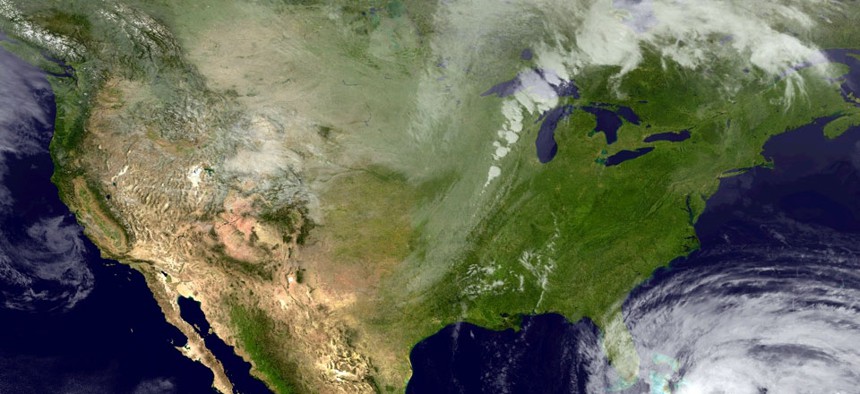Watchdog Zeroes in on Supercomputer Supply Chain Risks in Review of NOAA Satellites

This NOAA satellite image shows Category 2 Hurricane Sandy moving northward across eastern Cuba. NOAA/AP
NOAA maintains there will be no involvement by a Chinese company in a project to amp up capacity of supercomputers that generate climate and weather forecasts.
Federal auditors are monitoring a risk the National Oceanic and Atmospheric Administration is taking by upgrading forecasting supercomputers while contractor IBM sells parts of its supercomputing business to a Chinese firm.
NOAA's chief information officer asked the Government Accountability Office to delete this concern from an initial copy of one of the watchdog agency's reports. But auditors said they will continue to inspect the situation.
The House Science and Technology Committee next month plans to hold a hearing that will examine the agency's overall program management and GAO’s findings on the aging polar satellite system, the committee's chairman told Nextgov on Thursday.
"NOAA suggested we remove our discussion of a programmatic risk associated with a contractor’s sale of its server business to a foreign company," David Powner, GAO director of information technology management issues, said in a final copy of the report, which came out today.
The agency maintains there will be no involvement by the Chinese company, Lenovo, in the $44.5 million deal to amp up capacity of supercomputers that generate climate and weather forecasts. IBM will install computers that increase processing volume by almost tenfold -- from a different U.S.-based firm, Cray. Big Blue, which spun off its own x86 supercomputing business to Lenovo last year, will not be providing any machinery, according to NOAA.
"NOAA’s CIO stated that the terms of the sale ensured that this risk was addressed. We removed this risk from our report, but will continue to monitor the agencies’ efforts to manage and oversee the maintenance of its servers," Powner wrote.
The supercomputing enhancements were originally scheduled to be finished by December 2014 but the project likely will be delayed by at least a year "to implement risk mitigation activities associated with the sale of a vendor’s server business," he said.
Science and Technology Committee Chairman Lamar Smith, R-Texas, said in an email that he will hold an oversight hearing on the consequences of the project delay.
"The ability to make timely and accurate weather forecasts should be a top priority for the National Oceanic and Atmospheric Administration," he said. "Unfortunately, our next-generation weather satellites have been plagued by problems, including dysfunctional management, delays and cost overruns. As a result, gaps in our domestic weather data could jeopardize our forecasting capabilities, putting American lives and property at risk."
The snafus are a problem because the weather service cannot even test the accuracy of new simulations until the system is in place, according to auditors. An interim fix next month is expected to supply about half of the total planned capacity -- 2.5 petaflops -- so forecasters can try out some new modeling tools. The full upgrade should be complete by July 2016, GAO estimated.
The supercomputers aid satellite command and control, and run climate predictions instrumental in aviation, emergency response and other daily activities.
Last summer, an inspector general report berated NOAA for letting slide tens of thousands of major vulnerabilities that could let hackers into the satellite operation.
Lawmakers last fall expressed uneasiness about Lenovo potentially installing corrupted computing parts, especially after NOAA that November confirmed a report that hackers had weather prediction and satellite systems.
Smith's concerns about supply chain threats, however, were considerably alleviated when NOAA said Cray would provide the new systems, a committee aide told Nextgov.
In a letter responding to a draft report, dated October 2014, officials at the Commerce Department, NOAA's parent agency, consented to the auditor's advice.
NOAA "appreciates the opportunity to review and comment on the Government Accountability Office draft report on Polar Weather Satellites," and agrees with "all" GAO recommendations, Commerce Deputy Secretary Bruce Andrews said.



